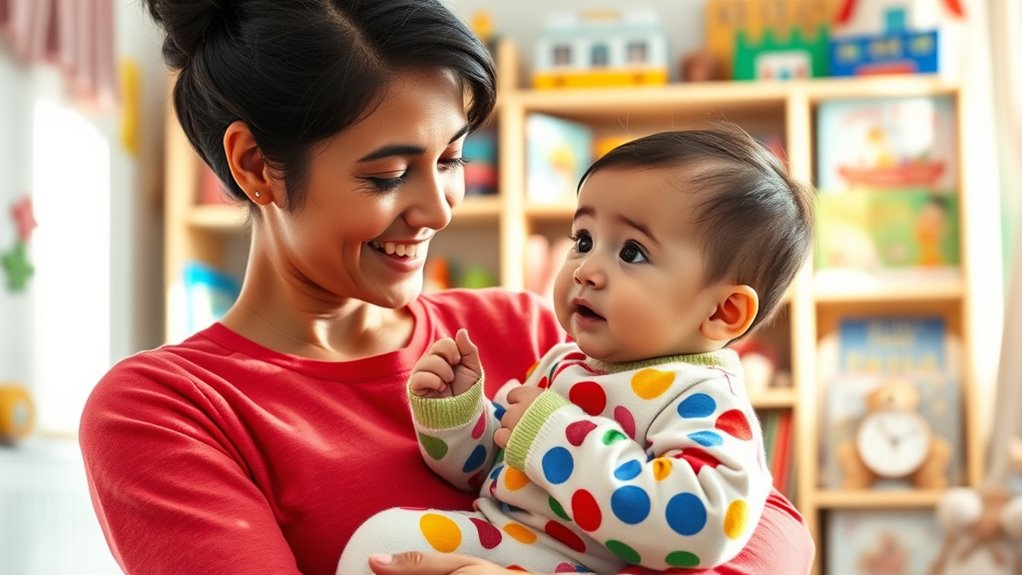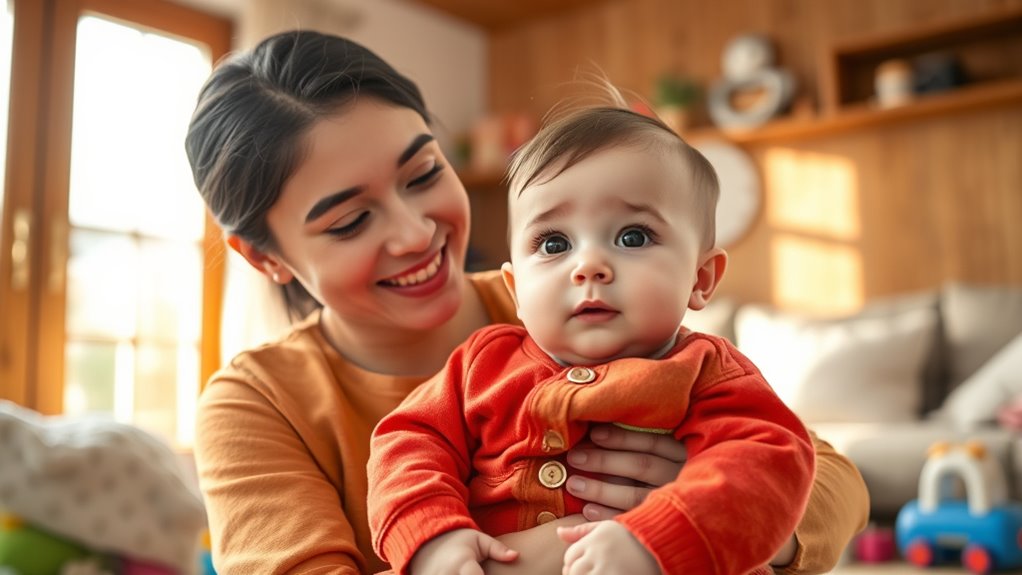Talking to your baby in two languages boosts brain power by enhancing cognitive flexibility, problem-solving, and executive skills early on. It helps them recognize different linguistic patterns through natural switching and develops mental agility to understand context, tone, or meaning. This dual-language exposure also builds strong auditory skills, cultural identity, and emotional security. As a result, your child gains cognitive and social advantages that lay a solid foundation for future success. Explore more to see how this benefits their growth even further.
Key Takeaways
- Bilingual exposure enhances cognitive flexibility, problem-solving skills, and executive function from an early age.
- It improves auditory discrimination, pronunciation, and linguistic awareness, laying a strong foundation for language mastery.
- Talking in two languages fosters mental agility and encourages flexible thinking vital for creativity and adaptability.
- Bilingual interactions strengthen cultural identity, pride, and emotional security, supporting overall cognitive development.
- It cultivates better multitasking, perspective-taking, and social skills, boosting brain power for diverse environments.

Talking to your baby in two languages can boost their cognitive development and strengthen your bond. When you switch between languages seamlessly, a practice known as code switching, you’re exposing your little one to the complexities of multilingual communication early on. This not only helps them recognize different linguistic patterns but also encourages flexible thinking, which is vital for problem-solving and creativity later in life. Your child learns to adapt quickly, understanding that meaning can shift depending on context, tone, or language. It’s a skill that fosters mental agility and enhances executive functioning, which includes attention control and working memory.
Bilingual talk enhances cognitive flexibility, problem-solving, and executive function in your child from an early age.
Moreover, speaking two languages from an early age supports the development of a strong cultural identity. Your child begins to associate certain words and expressions with their cultural background, instilling a sense of pride and belonging. This dual-language exposure weaves a rich tapestry of history, traditions, and values that shape their worldview. When you talk to them in both languages, you’re not just teaching vocabulary; you’re passing down cultural stories, idioms, and customs that form their unique identity. This reinforces their understanding of where they come from and nurtures a deep connection to their heritage.
By engaging in bilingual conversations, you also help your baby become more sensitive to linguistic nuances. They learn to distinguish sounds and intonations that are specific to each language, which sharpens their auditory discrimination skills. This heightened awareness can translate into better pronunciation and accent development, setting a strong foundation for future language mastery. Additionally, code switching—alternating between languages within a conversation—becomes a natural part of their communication style. It demonstrates that language is adaptable and flexible, which can boost confidence when expressing themselves in different social settings.
Your consistent use of both languages builds a nurturing environment where your baby feels valued and understood in their cultural context. This emotional security encourages curiosity and a willingness to explore new words and ideas. As they grow, they’ll carry this bilingual foundation into school and social interactions, often outperforming their monolingual peers in tasks that require multitasking or understanding multiple perspectives. In essence, talking to your baby in two languages doesn’t just make them smarter; it cultivates a resilient, culturally rooted individual capable of navigating an increasingly interconnected world.
Frequently Asked Questions
When Is the Best Time to Start Bilingual Conversations With My Baby?
You should start bilingual conversations with your baby as early as possible, ideally during their first few months. This helps support their language milestones and encourages early communication skills. The sooner you introduce two languages, the more naturally your baby absorbs sounds and words. Engaging in regular, two-language interactions from the start creates a strong foundation for bilingual development, making language learning easier and more intuitive as they grow.
How Can I Balance Two Languages Without Confusing My Baby?
You might think balancing two languages is like walking a tightrope over a volcano, but it’s easier than you imagine! To prevent confusion, embrace gentle code switching and language mixing, like sprinkling seasoning on a dish. Use consistent cues for each language, like different tones or contexts, so your baby learns the difference. With patience, your little one will master both languages without feeling overwhelmed or mixed up—promise!
Will Speaking Two Languages Delay My Baby’s Speech Development?
You’re worried that speaking two languages might cause a language delay or speech confusion. Rest assured, research shows that bilingual babies typically reach speech milestones on time. Your child’s brain is adaptable and can handle dual languages without delay. To support development, speak clearly, be consistent, and give your baby plenty of opportunities to hear both languages. This balanced approach helps prevent speech confusion and promotes healthy language skills.
What Are Effective Strategies for Maintaining Both Languages Consistently?
They say “practice makes perfect,” and consistency is key when maintaining two languages. You can use strategies like language immersion, where you dedicate specific times for each language, and be mindful of code switching, ensuring clarity. Stick to routines, speak regularly in both languages, and encourage your baby’s responses. This way, you build a solid bilingual foundation without confusion, making language learning a natural part of your daily life.
Can Bilingual Exposure Influence My Child’s Social Skills Positively?
Exposure to two languages can positively influence your child’s social skills by enhancing their understanding of different perspectives. As they learn code-switching, they become more adaptable and culturally aware, strengthening their cultural identity. This bilingual environment encourages empathy and communication, helping your child navigate diverse social settings confidently. By fostering these skills early, you’re setting the foundation for a well-rounded, culturally sensitive individual.
Conclusion
So, why not give your baby the gift of bilingualism? Talking to your little one in two languages not only boosts their brainpower but also opens doors to a world of opportunities. Imagine planting a seed today that will grow into a lifelong advantage tomorrow. Isn’t it worth the effort? Embrace this dual-language journey—your child’s future self will thank you for the brain boost and cultural richness you’re helping nurture.









